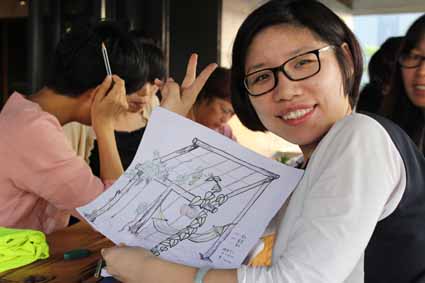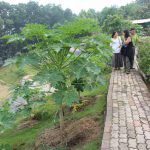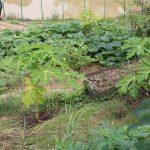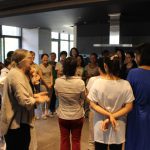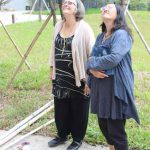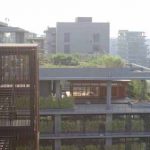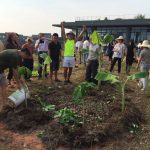Articles, Permaculture Around The World, Team Blogs
Permaculture in Shenzhen, China
In early October I made my third journey to the Chinese city of Shenzhen to teach a PDC with my wonderful Taiwanese colleague, Hui-i Chiang. This was the second full design course hosted by Taihua company at Wutong Island, which they intend to make an annual event. It was great to see how the site had developed over the past 12 months.

The forty PDC participants came from diverse backgrounds, many of them business managers, design professionals plus some from NGOs working in rural areas and with ethnic minorities. There was only one farmer who is managing an organic market garden/CSA at the Shenzhen Xili Golf Club.
We visited the garden at Shenzhen Xili Golf Club on our day off and met up with his boss, an American called Brian, who spoke enthusiastically about making the entire golf course a model of sustainability. Sounds like some kind of bizarre oxymoron, however they have already eliminated the use of all chemicals on the golf course and allocated more land to expand the CSA production area to supply organic vegetables and fruit to club members.
Future plans include setting up a major composting system for the golf course landscape green waste and food waste from the clubhouse, and to plant food forests in the tree landscapes that define the green runways. Sponsoring their gardener to do the PDC was their investment towards achieving these aims. Several participants from last year’s Shenzhen PDC have been volunteering in the market garden and the influence of permaculture ideas were already quite evident.
After the golf club, we visited an organic farm on the outskirts of Shenzhen at the base of Wuton Mountain. The farm is located right on the edge of an interesting village which is a designated artists area. Here the government has provided low-cost housing and studios for artists in a beautiful natural environment away from the noise and pollution of the city.

The farm owner, Zhang Li, welcomed us at the gate and invited us in to a lovely deck overlooking a large pond for a traditional tea ceremony while she told us her story. Zhang started with a small area of land six years ago with view to becoming food self reliant and selling the surplus. Her organic farm generated much interest and received a lot of visitors, so a year ago with the support of a business partner she began expanding and leased some adjoining farmland.

She discovered that as well as buying fresh organic vegetables, some of her clients were interested in having their own plot to garden. There are now 25 people who rent garden plots and continue to purchase fresh vegetables from her. The expansion also involved improving the kitchen to create a small café to sell tea and refreshments to renters and visitors, and a space for holding workshops and talks. She now has 2,500m2 (1 ha) under production and employs 3 full-time and 3 part-time workers. She has recently leased a 3ha former tree nursery, also adjoining her original land parcel, which has mature trees for advanced stock sales and she is interested in ideas to convert parts of it into a food forest.
Back at Wutong Island in the city for the last week of the PDC , the Taihua staff had returned to work from the national holidays, which are during the first week of October. Quite a few had participated in last year’s PDC there and were keen for us to explore their rooftop gardens, two well established and two in early stages.

With the return of the company staff we were all in for another pleasant surprise. The Taihua company culture is rather unique, not only encouraging staff to garden the rooftops, but every day a group of staff members are rostered to cook lunch for everybody, that included all the PDC participants as well as the 100 staff. Everybody takes their turn cooking, from the lowliest positions to the professional architects, engineers and landscape designers and even the general manager.

We certainly had fun and lots of laughs getting our mulch and materials up onto the rooftop for our practical, and every trip up the lift fully maximised the carrying capacity of the wheelbarrow. We installed and planted a banana circle and a series of keyhole garden beds to get the fourth roof top garden at Wutong Island off to a good start. Our course design projects focused on designing one of the new rooftop gardens (where we installed a banana circle as a course practical project), designing a small food forest at ground level plus ideas for some vertical production and greening for the south-facing wall and balconies of a seven-story building.
At the end of the course I had a meeting with the manager and several senior staff to discuss how the Wutong Island project could become more sustainable and strengthen the application of permaculture strategies in the landscape and management systems. I was heartened to hear the manager confirm his commitment to doing what he can to make this project an example of urban permaculture, and I think he was heartened by my willingness to support that process.
Jorja Callow, diploma student at PCA came as an assistant for the PDC, read her report HERE


